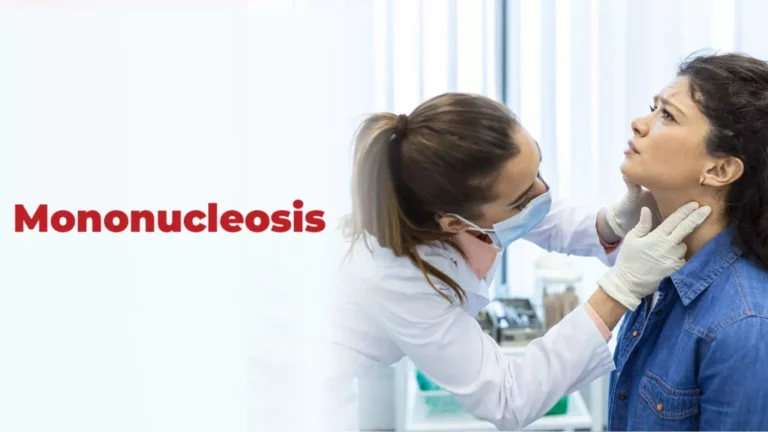Plantar warts are little growths that appear on the sole of your feet and usually make it uncomfortable when walking. The question many people ask is: Are plantar warts contagious? Yes, they are due to the human papillomavirus (HPV) that is contracted because of direct skin contact or polluted surfaces such as locker rooms and pool decks.
Plantar warts are not harmful, but are painful and difficult to treat. The awareness of how they transmit, their appearance, and optimal methods to treat or prevent them will keep you safe.
What are plantar warts?
Plantar warts are rough skin growths that show on the bottom of your feet, and are mostly found in those parts that support most of your body weight, such as the heels or the balls of your feet. They are a result of some of the human papillomavirus (HPV), which enters your skin with the help of small cuts, scratches, or weak points.
Plantar warts are distinct from ordinary warts that always appear on hands or fingers, since the pressure of walking and standing causes them to the soles. This causes them to be a hard lump that is just beneath the skin, which can be covered by a thick layer of callus. They can also contain small black dots within them, but they are, in fact, tiny blood vessels.
Understanding Are Plantar Warts Contagious helps individuals make better choices to protect themselves in public places. Plantar warts may be painful due to their location, and one may feel like having a tiny stone in the shoe when walking.
Who can get plantar warts?
Plantar warts can develop in anyone, even though there are those who are more susceptible to them. Especially susceptible are children and teenagers, and individuals whose immune systems are weak. Those who often walk barefoot in places of communal comfort, like pools, locker rooms, or gyms, are also in increased danger.
How common are plantar warts?
Plantar warts are very common, especially in children and adolescents. Studies suggest that up to 10% of the population may be affected at some point. Although plantar warts often resolve on their own, they can persist for months or even years without treatment.
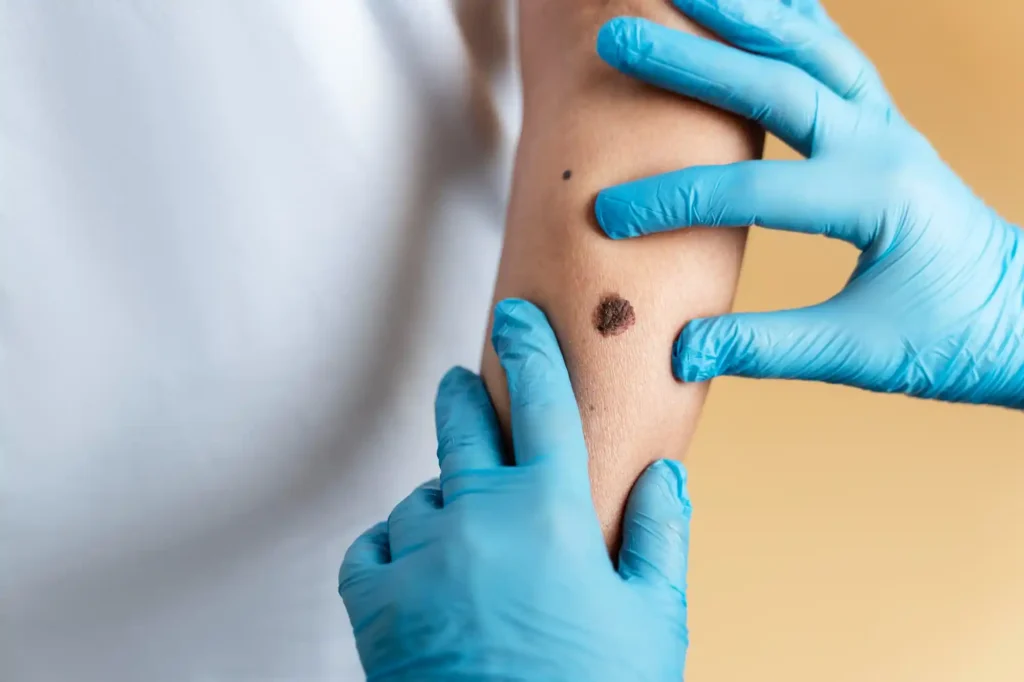
Transmission: How Plantar Warts Spread
So, are plantar warts contagious? Absolutely. The plantar warts are parasitic, i.e., they are spread by direct contact with HPV or indirectly by contact with the surfaces contaminated with HPV.
You may catch HPV by:
- Wearing no shoes on wet floors, such as showers, locker rooms, or on the decks of swimming pools.
- Changing Shoes, socks, or towels with one who has plantar warts.
- Touching a wart on someone’s foot.
How do plantar warts affect my body?
Although plantar warts are not harmful, they may result in pain, discomfort, and walking difficulty. Some individuals form groups of warts known as mosaic warts, which can be particularly stubborn and painful.
Plantar Warts: Symptoms & Signs to be aware of
Early detection of plantar warts may ease the treatment and prevent spreading. These are the main points that should be noticed:
What do they look like?
In case you are curious, what does a plantar wart look like? The following are the most common ones:
- A hard bump on the bottom of your foot, usually on the back part or the ball.
- It has a cauliflower appearance of small black dots within it. They are clotted blood vessels, known as wart seeds.
- A hardened layer of skin (callus) develops over the wart due to constant friction from walking.
- Warts can either be single or in clusters ( called mosaic warts), and they may extend to occupy more space on the foot.
How Do They Feel?
People often ask, Are Plantar Warts Contagious, because they want to know if they should take extra precautions. Warts on the sole are painful. Most people define them as being like a rock or pebble caught in the shoe. They can cause:
- Pain or discomfort during standing or walking.
- Pain is sharp when pressure causes further infiltration of the wart into the skin.
- Further pain occurs when they have several warts in one spot.
What causes plantar warts?
Plantar warts are the result of some human papillomavirus (HPV). The virus penetrates your flesh through small cracks, or openings. Since HPV can grow in warm and moist environments, you are more likely to contract it in:
- Locker rooms
- Swimming pools
- Public showers
Not all people exposed to HPV have plantar warts. The reaction of your immune system is a major factor in getting them or not.
How do I manage my plantar wart symptoms?
In the event of having plantar warts, the following steps may be taken to reduce the discomfort and avoid infection:
- Wear cushioned shoes or padlocks to decrease pressure on the wart.
- Warts should not be scratched, cut, or picked because this will transmit the virus.
- Topical salicylic acid over-the-counter agents, which soften the wart tissue over time, should be tried.
- Use plantar wart supportive therapy like padding, insoles, or orthotics to relieve the pain as you proceed with the treatment.
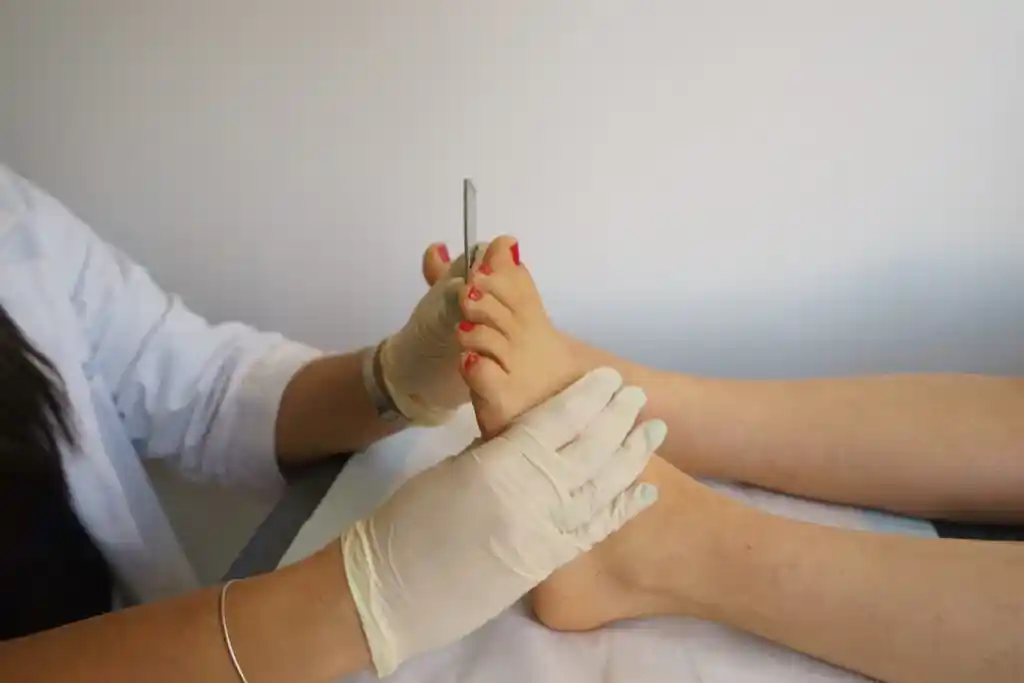
Why Treating Plantar Warts Is Necessary
While not extremely dangerous, plantar warts infectious nature makes prevention important. Some individuals opt to ignore plantar warts, hoping that they will fade away. Sometimes the immune system of the body does fight off the virus. Nevertheless, the process might require months or even years, and in between, the warts might become sore, other sections of your feet might be affected, or the infection might be transferred to other people.
The question Are Plantar Warts Contagious often arises because they are caused by the human papillomavirus (HPV). Early treatment of plantar warts not only relieves and lessens symptoms but also helps to avoid larger issues in the future.
1. Effective Pain Management
Plantar warts develop in the parts where one bears his/her weight, such as the heel or ball of your foot. This pressure tends to drive the wart further into the skin, causing pain when one has to walk or stand.
The treatment will assist in getting rid of the wart, pain, and allow you to walk normally again, hence you do not feel that you are walking around with a pebble in your shoe.
2. HPV Transmission Prevention
Knowing the facts about Are Plantar Warts Contagious?, can help reduce unnecessary worry and confusion. Plantar warts are contagious, and this means that the virus can be easily spread. Through the treatment of warts, you reduce the chances of transmitting HPV to other individuals using common surfaces or even to other parts of your own feet. Early treatment will prevent an infection cycle.
3. Doing Nothing Leads to Complications
Plantar warts, untreated, may not seem harmful, yet they could lead to some complications:
- Warts might grow in other places.
- The warts may grow in large clusters, which are more difficult to heal.
- Walking / Standing for long can be painful, which may affect daily activities and quality of life.
- Avoiding pain may alter how you walk, leading to foot, knee, or back strain over time
Early treatment is likely the best option.
Diagnosis and Tests
Recognizing a plantar wart at home can sometimes be tricky because it may look similar to a callus or corn. That’s why seeing a healthcare provider can help confirm the diagnosis and rule out other foot problems.
How are plantar warts diagnosed?
Doctors usually identify plantar warts by:
- Physical examination – Your provider will carefully check the bottom of your foot, looking for rough growths, black dots (tiny blood vessels), and disruption of the normal skin lines.
- Paring down the surface – Sometimes the doctor will gently shave off the top layer of the thickened skin. If small black dots (clotted blood vessels) appear, it’s usually a sign of a wart.
- Biopsy (rare cases) – If the growth looks unusual, doesn’t respond to treatment, or the doctor wants to rule out other conditions, a small sample of skin may be sent for lab testing.
In most cases, a simple exam is enough, and no invasive tests are needed.
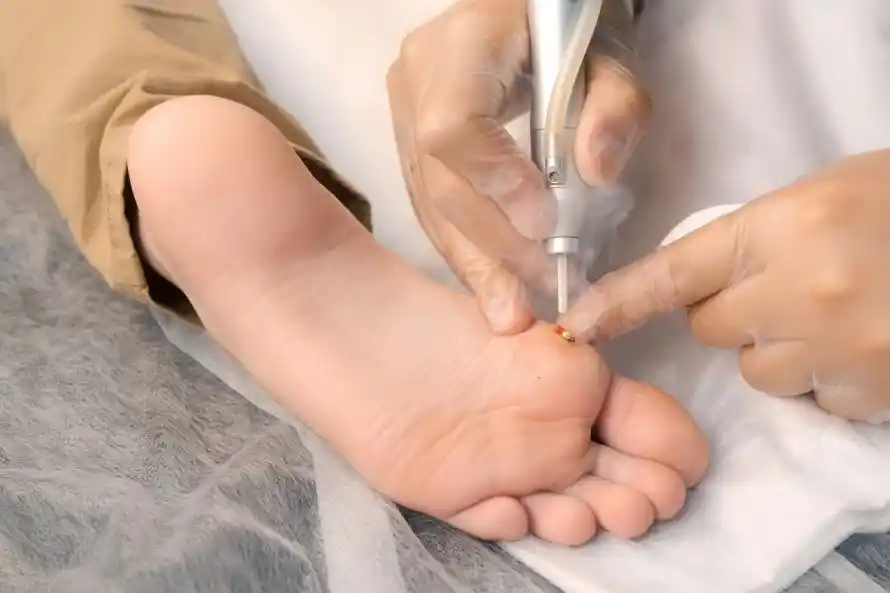
Management and Treatment
If you’re asking, Are Plantar Warts Contagious, the simple answer is yes, but they don’t spread as easily as some other infections. Plantar warts can sometimes go away on their own, but many people choose treatment because of pain, discomfort, or the risk of spreading the virus. Treatment options range from at-home remedies to medical procedures performed by a healthcare provider.
How do you remove a plantar wart?
There are several plantar wart medical procedures available:
- Cryotherapy (freezing therapy): Liquid nitrogen freezes the wart, causing it to blister and fall off.
- Laser treatment: Burns and destroys wart tissue.
- Minor surgery: Cutting away the wart (usually reserved for stubborn cases).
- Cantharidin application: Causes a blister under the wart, lifting it from the skin.
Are there any home remedies for plantar warts?
Some people try wart removal for feet at home. Options include:
- Over-the-counter salicylic acid patches or liquids.
- Duct tape occlusion therapy (covering the wart with duct tape).
- Natural remedies like apple cider vinegar (limited evidence).
While home remedies may help in mild cases, persistent or painful plantar warts usually require professional treatment.
Prevention tips to reduce my risk of developing plantar warts?
To lower your chances of catching plantar warts:
- Always wear footwear in public showers, gyms, and pool areas.
- Keep feet clean and dry.
- Change socks daily.
- Avoid sharing shoes, socks, or towels.
- Boost your immune system with a healthy lifestyle.
What Questions Should I Ask My Healthcare Provider?
If you think you may have plantar warts or if they’ve become painful, it’s a good idea to talk to your doctor. Asking the right questions can help you understand your condition better and choose the most effective treatment. Here are some important ones:
When should I see my healthcare provider?
You should see a doctor if your plantar wart is painful, spreading, or not improving with home treatments. People with diabetes, poor circulation, or weakened immunity should seek medical care right away, since foot problems can cause more serious complications in these cases.
What is the difference between a plantar wart and a corn?
It’s easy to confuse the two, but your doctor can explain the difference:
- Plantar wart: Caused by HPV, often has black dots, and disrupts normal skin lines.
- Corn: Caused by friction or pressure, usually smooth and without black dots.
Knowing the difference helps ensure you get the right treatment.
What is the difference between a common wart and a plantar wart?
Both are caused by HPV, but they appear in different places:
- Common wart: Typically found on fingers, hands, or elbows.
- Plantar wart: Develops on the soles of the feet and may be pushed inward by pressure, causing pain when walking.
Your provider can confirm which type you have and suggest the most suitable treatment.
Are plantar warts an STD?
No. Even though plantar warts are caused by HPV, the strains that affect the feet are not sexually transmitted. They are spread by direct skin-to-surface contact, such as walking barefoot in communal showers or pool areas. Asking this question helps clear up a common misconception.
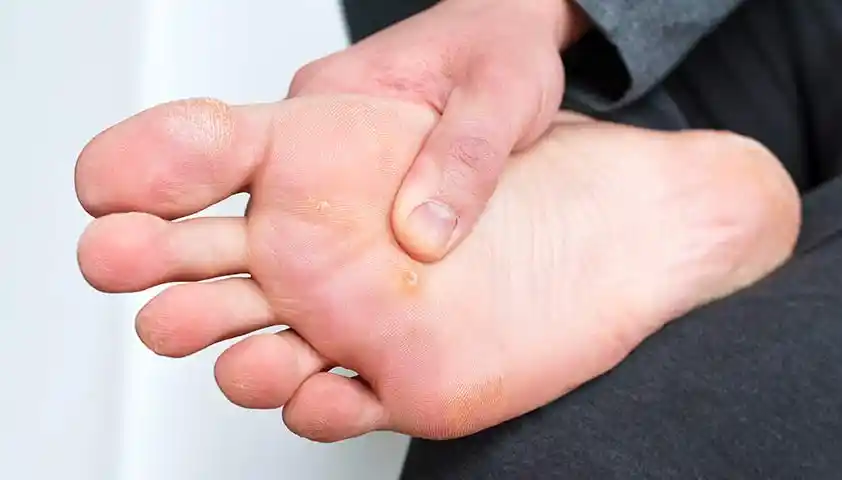
Conclusion
Are Plantar Warts Contagious? Yes, plantar warts are contagious, which is why recognizing, treating, and preventing them is so important. Since they can spread through direct and indirect contact, proper care and hygiene help protect both you and others.
By knowing what to look for, managing symptoms early, and seeking medical care when needed, you can reduce discomfort and stop the spread of HPV. Addressing plantar warts promptly keeps your feet healthy and prevents long-term complications.
Don’t let plantar warts slow you down. At Novamed, our foot specialists offer safe, effective treatment options tailored to your needs. Book your appointment today and take the first step toward pain-free, healthy feet.

